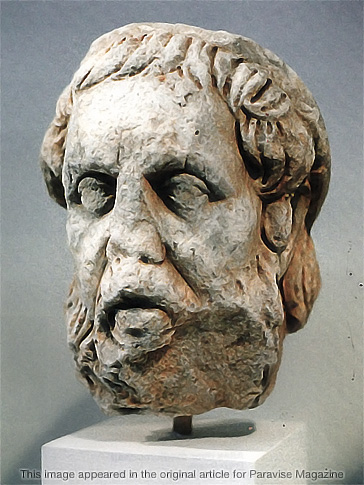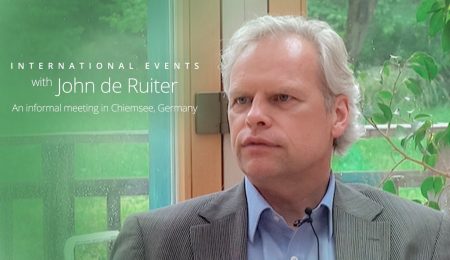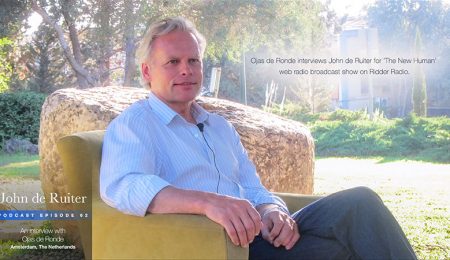Article & Interview with John de Ruiter By Neils Brummelman from “Paravisie Magazine.” This is an English translation of an article that originally appeared in the October 2010 Issue of Paravisie Magazine. It was based on an interview that took place between Neils and John in The Netherlands.
Canadian John de Ruiter fits the form of the modern philosopher: neat suit and beard, serious look in the eyes and precise in speech. Yet he is not an everyday man. Far from it. Apart from his message, John’s mere presence moves people, as it did in Amsterdam last August. In the coalescence of the message and the man, John is a modern Socrates, the Greek philosopher who was known for his charisma and, like John, sought out the ultimate knowledge of the deepest self.
The contrast could hardly be greater. Was this truly the man I had interviewed with such pleasure only an hour ago? The man who, although somewhat reserved and laconic, had answered my questions with frankness, openness, and a smile? Now this man was a philosopher, barely speaking, who stared stoically into the room. When he did speak, his voice was soft and level. But most striking was the silence. At least fifteen minutes passed before anything was said at all. It made me laugh a little, but the brimming audience was undisturbed. On the contrary, most people seemed to enjoy John’s pace and presence. The scarce questions where preceded by long periods of silence, and when finally the microphone was taken in hand, only a few stammered sentences were fired away to the man on stage sitting in his chair. The man who gazed into the deep. Did I have to become a better listener to understand?
Back to the beginning.
The Beginning
John de Ruiter was born on November 11th 1959, and raised in Stettler, a small town in South-West Canada. His parents were Dutch immigrants and his father was a shoemaker from The Bildt. As a boy, John was an active and curious little fellow who loved working with his hands. When he was seventeen something wondrous happened: an ineffable feeling of beauty and truth awakened deep inside of him. From this place, his perception of the world suddenly changed and the trivial obtained a sacred character. After one year it was gone without warning. John struggled to regain his inner peace, but to no avail. Until…
What happened when you were twenty John?
John: ‘For two years I was busy digging out my own well. When I hit the bottom I surrendered to the feeling that all was fine the way it was. I accepted the situation and that changed everything. I suddenly rediscovered the source of absolute truth that had always remained present in me and that had nurtured me for a year. It was only after dropping all illusions and as such in complete honesty, in so-called full nakedness surrendering myself, that I regained access to this little flame of essence which had stayed untouched and lovingly burning in me despite all conditionings.’
Ultimate Truth
John’s pursuit of the truth about himself and the world turned out to be an integral part of the process, revealing that in the end the search is not necessary. Truth lives in each one of us. ‘To understand that there is no necessity to search, a high level of awareness is needed. Without that, surrender is not possible. Such a level of awareness can only come into being by core splitting honesty and questioning everything you think you know and feel. Are my thoughts and feelings truly valid? As soon as you discard everything you do not honestly know the truth of, only the ultimate truth remains. The search should never be the goal, but is a means that at some point may be let go. Because there is a truth that is more fundamental than that,’ says John. It’s a complex matter, I tell myself. ‘Consciousness is complex,’ is the Canadian’s response to the question marks that are written in neon letters on my forehead. ‘When there is no absolute honesty, part of your awareness denies that part which it knows to be true. It actually is a simple concept. Simple, but not superficial.’ Mmm, that still doesn’t help. I decide to change my tack.
You often speak of truth. Does a single truth exist or is it a collection of individual truths?
John: ‘It depends on the reality level you speak of. Do you mean the level of the personality or the self, in which case there are more forms of truth? These only apply to one individual. The higher you climb the ladder of consciousness, the more universal the truths become. Up to the point where you realize the truth of the absolute. On that level truths don’t just count for everybody, but for everything.’
A Schizophrenic Society
Okay, this I understand. But what then is that ab-so-lute truth John so frequently speaks of? Unconditional love?
John: ‘There is truth in what you think, feel and experience, but that isn’t pure truth. Awareness that is completely honest takes serious what it truly knows and is dedicated to that. Remove everything you don’t know for sure and embrace that which remains. It may be very little, but only by that fraction you may find the deeper and finer truth behind everything else. You will be capable of integrating the absolute in your daily life, which on return will be impregnated by meaning and fulfilled with value and purpose. By eliminating and scraping you don’t become poorer but richer. I always say: the less you can be the bigger you become.’
‘Know thyself’, was Socrates’ famous imperative. The Greek philosopher wondered how one could know anything if one didn’t know oneself. Like John, he looked for the ultimate knowledge of the deepest self, without which nothing can be truly known. To a degree, we are all conditioned. Through our genes, our upbringing, the society we live in (and perhaps even through the morphogenetic field) we absorbed information into our system. This conditioning deserves scrutiny as to whether or not it matches our deepest self. If not, we live in a schizophrenic society. One in which all of us do our utmost to suppress the truth by using falsifications and illusions. Has the discrepancy between our inner knowing and the outer ‘distorted reality’ become so big that people are overworked or physically ill? Could it be that we are afraid of our power and wisdom? It appears so.
John: ‘As soon as consciousness hardens and confines itself, it no longer has the same freedom of movement to experience the unmixed truth. This may cause all kinds of problems which we see reflected in our society. But that is fine, that’s okay. It will create new possibilities.’
Okay!
 The word `okay’ presents itself for the first time. It refers to ‘okayness’ which is central to John’s philosophy. In his terminology it is best understood as `loving acceptance.’ If your life is in service to the tiniest bit of truth within, then loving acceptance is always present, in whatever circumstances. According to John, in moments of intense sorrow or immense physical pain, ‘okayness’ persists. ‘That doesn’t mean to say that we have to accept everything. When an injustice has been done, you may do something about that on an Earth level. At the same time on another level a feeling of ‘okayness' can exist.'
The word `okay’ presents itself for the first time. It refers to ‘okayness’ which is central to John’s philosophy. In his terminology it is best understood as `loving acceptance.’ If your life is in service to the tiniest bit of truth within, then loving acceptance is always present, in whatever circumstances. According to John, in moments of intense sorrow or immense physical pain, ‘okayness’ persists. ‘That doesn’t mean to say that we have to accept everything. When an injustice has been done, you may do something about that on an Earth level. At the same time on another level a feeling of ‘okayness' can exist.'
What a relief: John’s abstract philosophy towards an unruly reality is extrapolated and his ‘okayness’ refers to a more subtle reality. But again I feel cramped: does honesty to the core not also entail the recognition that potentially all our motives, ambitions and relationships are based on false grounds? There is obviously a parallel between John’s philosophy and Buddhism, where detachment and release are also key principles. Thoughts and emotions are fallible and we cannot even rely on intuition. All these human characteristics do not define who we are. John acknowledges that the letting go is essential.
But John, might we become disillusioned if we choose to follow such perfect honesty?
John: ‘If the `letting go’ would be the final destination, everything after that would be just dull distraction. We would lose the love for life, resulting in an unworkable situation. Fortunately, the nature of awareness is to express truth. We may in this world therefore work with our more subtle evolved state of being and be persistent without personal attachment.’ I wonder if this isn’t a difficult task in our Western society with all its material distractions. In the manner of Dutch soccer player, Johan Cruyff, John replies that ‘the disadvantage also has its advantage: the more fanatic you pursue material and physical pleasures, the more you will be confronted with its faultiness and the quicker you will realise that there must be more.’
Community of Hearts
John believes that as humanity we have arrived at a crossroads. At the current threshold, so many people may seek, find, and abide by the deep truth, that others will share in such proximity, and in fact by natural law, will follow. Information technology is hugely instrumental in spreading the message and realizing ‘a community of hearts,’ as John so beautifully phrased it. However, a manipulation of the truth, and digression in the development of awareness would still be `okay,’ according to John. ‘It might all take a little longer, but that which is true will always surface. The key that will make all things work and indeed does make it work is full, non-compromising honesty.’
Back to the seminar, where the community of hearts has long understood what I realise only now in retrospect: truth lies hidden in the deep and in the stillness. In fewer words rather than in more. That realizing true honesty may take time, but that its forthcoming reality is eternal. Thus, John’s seminar…was precisely okay.
– Neils Brummelman
www.paravisie.nl



